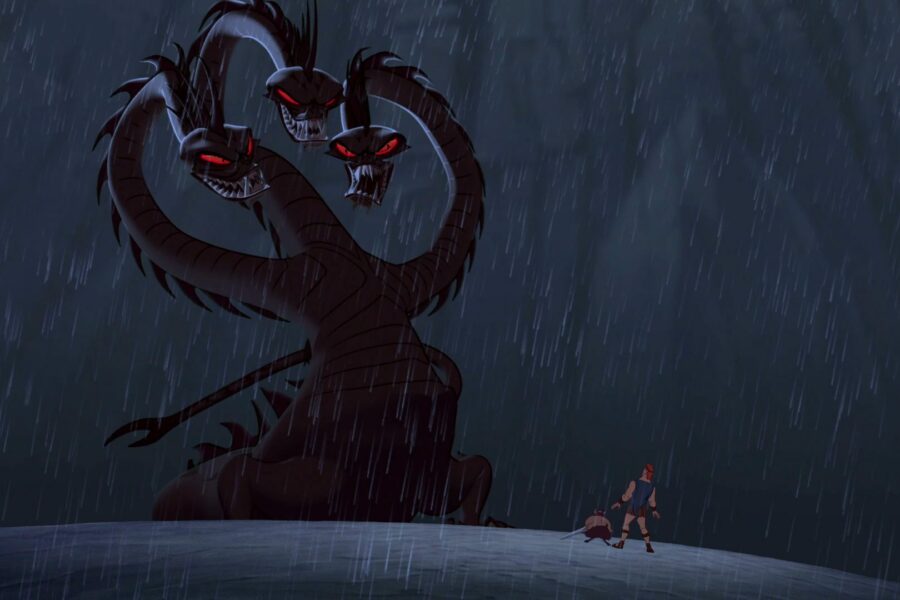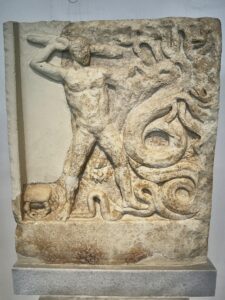
This is why you can’t keep that cure baby snake you found in the swamp that one time.
Meeting 13: In which Hercules battles a monster and kicks a crab, and his nephew Iolaus tries and fails to invent germ theory.
This episode of Mythology Pitch Meetings brought to you by CLAS-C 205 Classical Mythology.
Have you ever wondered how your favorite Classical Myths came to be? This is absolutely not how that happened, but it could have happened, maybe, and that’s the point of mythology. Shout-out to Ryan George, whose Pitch Meeting video series inspired the Muses.
CALLIOPE, MUSE OF EPIC POETRY: So you have another one of those Hercules labor myths to pitch to me?
HOMER, UNCONTESTED G.O.A.T OF ANCIENT POETRY: Do I! As you may recall, Hercules has been indentured to King Eurystheus by the Delphic Oracle to complete 10 amazing tasks, or labors. But Hera has given Eurystheus orders to use this opportunity to try to kill Hercules!
CALLIOPE: Are we going to skip over the recap of how he murdered his entire family and that’s why he has to complete all these labors? As some sort of penance, where the punishment absolutely has no correspondence to the crime?
HOMER: Yes, please. Anyway, the first labor was to kill the Nemean Lion, which Hercules not only easily completes, but turns into a signature fashion statement. So now Eurystheus realizes he has to up his murder assignment game, and he sends Hercules to fight the dreaded Hydra of Lerna.
CALLIOPE: Hydria? Like a water jug?

A water jug (hydria) depicting women dancing with water jugs. We’ve got Greek pottery puns, y’all!
HOMER: No, like the coolest monster ever. It lives in a swamp, and has nine snake heads, and every time you chop off one head, two more grow out of the stump! Plus one of the heads is immortal!
CALLIOPE: Why?
HOMER: Why what?
CALLIOPE: Any of it. Why does it have murder-to-multiplication powers? Why is one head, but not the others, immortal? If you cut off the immortal head, do two more grow in its place, and if so, are those heads all immortal? Or just one of them?
HOMER: Um, look, I didn’t really think this monster through. I did eat too much eel stew last night and have some really weird dreams.
CALLIOPE: Fine, I’ll allow it for now, but no more of this nonsense. Only actual animals going forward.
HOMER: Deal. So anyway, Hercules heads up to Lake Lerna with his buddy, Iolaus. They wade into the swamp, until they find the Hydra, and then it’s chopping time! But every time Hercules chops off a head, two more grow in its place!
CALLIOPE: Right, you just said that would happen.
HOMER: Yeah, but Hercules has to figure that out for himself, because no one had ever chopped off a Hydra head and lived to tell the tale. Soon there are dozens of snake heads facing Hercules down!

Athena, goddess of strategy, desperately tries to get Hercules to just chill for a moment and think about this.
CALLIOPE: Wait, you said there were nine heads to start with, and you increase the count by one every time you chop off a head. Let’s generously say it takes three iterations for Herakles to figure out the cause and effect of chopping and head growing. That should be at most twelve heads.
HOMER: See, the thing is, Hercules is going to be sort of an idiot, and often the drunken kind. Except for when I need him to be clever. But thankfully for him, Iolaus is a bit smarter, and he figures out that if you cauterize the wound after the chop, the heads don’t grow back.
CALLIOPE: Whoa, that’s quite the leap of logic there. He figures out to treat the new heads as if they were infections?
CLIO, MUSE OF HISTORY (interrupting): That does make sense, from an ancient medicine perspective. They didn’t have a lot of options, so “let’s see if we can burn that” was a distressingly frequent go-to move. To be fair, burning nearly always solves the problem, in that if it doesn’t heal the patient, it kills the patient and the original problem becomes moot.
HOMER: Anyway, once they figure this out, Hercules and Iolaus go to work, with Hercules chopping off each head and Iolaus burning the stump. But it takes quite a while for them to finish up, because Hercules had already made so many heads. And meanwhile Hera checks in and realizes Hercules is going to be successful, which she doesn’t want.
CALLIOPE: So she intervenes directly to stop him?
HOMER: No, she decides to distract him by sending a really big crab to give him just such a pinching on his ankle.

And in the lower left corner, we have the Ancient Greek reminder that the real enemy is, as always, mediocre seafood.
CALLIOPE: The great goddess Hera, Queen of the Gods and notoriously crafty, can’t come up with a better plan to strike her enemy than annoying seafood?
HOMER: Well, they are in a swamp, so she doesn’t have that much to work with.
CALLIOPE: Couldn’t she just extinguish their torch? That would be game over for them. And that could have happened just by one of them tripping. Is it at least a monster crab that is difficult to defeat?
HOMER: Nope, it’s going to be super easy, barely an inconvenience. When the crab pinches Hercules, he kicks it so hard that it flies into the sky and becomes a constellation.
CALLIOPE: “The crab Hercules kicked one time” has to be the stupidest constellation ever.
CLIO: Actually, the constellation Cancer is going to become a major astrological sign. People are going to be convinced that its movement across the heavens has a direct effect on their personality and fortunes.
CALLIOPE: Mortals are so weird. What happens to the immortal head?
HOMER: Oh, right. Um, Hercules eventually chops it off too and…buries it under a rock.
CALLIOPE: You forgot about the immortal head, didn’t you.
HOMER: Yes, yes I did.
CALLIOPE: And you had crab in that eel stew, didn’t you.
HOMER: Yes, yes I did. But that doesn’t mean it isn’t a cool story. A monster with dozens of snake heads? That’s pretty terrifying. Although…Hesiod did have a suggestion on how to make the Hydra even scarier.
CALLIOPE: Which was?
HOMER: Instead of having snake heads, have the Hydra have a woman’s head.
CALLIOPE: Yep, that does track for that misogynistic bastard.

As Hercules raised his club to strike the Hydra, he paused, confused by her human visage. And at that moment, his Nemean Lion skin cloak decided to make a break for it.
Share on Instagram, or really wherever you want.
To learn more about how Greek heroes and constellations are connected (sometimes through kicking), enroll in CLAS-C 205 Classical Mythology, coming up as a late-start class in Spring 2024! Or for more discussion of why ancient medicine was the real horror, look for CLAS-C 210 Ancient Medicine and Modern Terminology, coming up Fall 2024! Can’t get enough of Ancient Greece and Rome? Earn a Classics Minor in just 15 credits!


